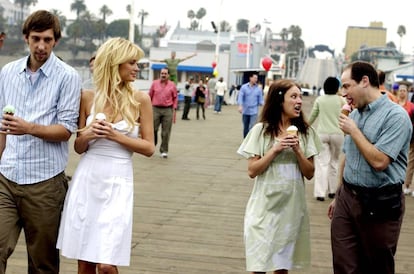What happens when you enter into an open relationship?
Many fantasize about breaking the norm. These four people did just that, and told us about their experiences (Spoiler: it didn’t all end well)
The Coolidge Effect, coined by the behavioral endocrinologist Frank A. Beach 50 years ago, describes a phenomenon that occurs among mammals where desire decreases if stimuli stay the same and are repeated over time. The sexologist Ignasi Puig presents a simple solution: change those stimuli.

“If a couple only has sex once a week and it is always on Saturday after dinner and a movie, and always inside the bedroom, it will lower their libido,” he explains. “A way to introduce variety to a relationship (of course, not the only way) can be to become sexually available to other people or couples [what is commonly known as ‘swingers’], but it must always be done with sincerity and communication,” continues Puig. “If not, no matter how much they are willing to share with others, the feeling of deception will still come, and it can be devastating for the couple. The moment a third person enters into the equation, fears and insecurities can arise, or in other words jealousy. That is why it is so important that this practice always be done with absolute sincerity and mutual understanding.”
His colleague Miguel Vagalume reflects: “We are seeing a boom similar to that of the 1970s with the so-called Summer of Love and the hippie communes; there were 2,000 or 3,000 communes in the United States. It is dangerous to paint it as something easy. Having two partners instead of one changes a lot of rules of the game that had been instilled in everyone’s lives.”
A common mistake is to choose an open relationship as a solution to preexisting problems Sexologist Ignasi Puig
“In the middle of the last century there were open relationships in Spain, so it’s not a new thing, but at that time it was against the wishes of many women who reluctantly accepted in silence that their husbands had a mistress, even other wives,” says Vagalume. “Luckily, that’s not the case today. Women are more self-sufficient and choose polygamy, or what is now called polyamory, in an open and agreed-upon way.”
Puig adds, “A common mistake is to choose an open relationship as a solution to preexisting problems. You have to turn it around: if you have partner problems, first solve them. And then think about changing the relationship model. If not, it's like trying to put out a fire with gasoline.”
After clarification, let us turn to the empirical evidence. Four people who have abandoned monogamy tell us about their experience. Some use pseudonyms, for obvious reasons.

“I have had open relationships for 22 years, with a main partner and several lovers on the side:” Afrodita Puig (42 years old, scientific researcher)
I'm not a ‘swinger,’ but I consider myself free. I have had open relationships for 22 years, with a main partner and several lovers on the side, some that I have been with for five or six years. We like it and the sex is fabulous, but we know it will never go any further. Although I am currently single, when I have been in those relationships, my partner becomes the most important thing for me. I have had long-lasting relationships with people who accepted who I was when I brought it up, or else they were also sexually liberal like me.
I am clear that there must be total sincerity from the beginning; jealousy has no place here. My last three relationships have been open and we have handled it well. One person goes out one night and says they aren’t coming home that night. The next day you ask: “Did you have a good time? Yes, honey.” And it’s perfect. Our sex life is much better. Of course, we have some basic rules, like never bringing a lover to the home we share and not specifying who it is, if the other person does not ask. The problems we've had do not stem from that. They have been cohabitation problems, similar to any other couple’s.
Being liberal is a lifestyle, not a desperate measure to have sex Afrodita Puig
Often I am shocked by the misunderstanding of our lifestyle, for example at the workplace, where obviously I do not share this part of me. In the end, my circle of friends is made up of people who share this way of life. We go to the beach, on vacation, or we make plans that don’t involve sex... A few weeks ago, I was at a birthday party. The surprise was that all his friends were sexually liberal, about 30 people. We all ended up in the pool, but not like an orgy, we all showed a lot of affection and respect for each other. Because in this world a “no” is a “no.” In a conventional nightclub, you say no and they usually insist again. Being liberal is a lifestyle, not a desperate measure to have sex. It is normal for me to meet up with friends and end up in an orgy, but always with a great deal of safety. Every three months we all get tested for sexually transmitted diseases. We are promiscuous with common sense. We are much more healthy than many people who go out to bars to get picked up.
“We have been married for 16 years, we have three children and we have been exchanging couples for four years,” Jorge and Rita (37 and 42, employees at software companies)
We have been doing this for about four years, and came to this in a natural way: one day we started talking about it because we both fancied it. It was a way to expand our sexuality, to create more possibilities and experiences together. We have become quite popular with our couple pseudonym, Kisshunters. We do not use our real names because we understand that in places, such as work, people don’t share this kind of lifestyle. We both fulfill our work and family obligations; it is a hobby like any other. We are ‘swingers,’ we exchange couples, but always together. We have been married for 16 years and we have three children, one is already a teenager. Although we think this is normal, we have not told our kids. Or much less practiced exchanging couples in our house. That belongs to our intimate moments. At a certain age, our children become aware that their parents have sex, but that does not mean that they have to know the details. One time a couple invited us to their house, and we saw children there and immediately left.
We do not see it as a way of life. It's something we will do until we stop wanting it. For the moment, it motivates us and makes us grow as a couple. We have never felt jealousy because we always do it together. We have made a name for ourselves in this world because we organize parties. On the first of each month we organize what we call novice dinners, where we bring together people who are experienced with those who want to start. They are always couples that we endorse, with a non-aggressive style, not seeking a pure sexual encounter, and who do not treat people coldly. Then we go to VIP Fusion in Madrid because they separate the area to interact from where you have a drink. And there you can go deeper at your own pace. Sometimes we just introduce people and don’t go any further.

The last party that we organized was at the Hotel Silken Puerta America where we got together 382 couples from all over Spain. We had to show up in formal dress. The top floor was a normal dance club; the other four floors had closed rooms where people could do whatever they wanted. We also have a blog called Kisshunters aimed at those who want to get started and do not know how. We create a community of people with the same interests. We had no one to explain it to us at first, never mind a community, and because of that we had some bad experiences at first.
“I practice ‘polyamory’ because I have romantic and sentimental maturity,” Karen Moan, 44
I practice polyamory. I love more than one person at a time in a consensual and ethical way, because I have romantic and sentimental maturity. Since then, I have had moments of full love, some lasting for years, when I felt that I had a partner that gave me the freedom to be with other people, to be myself and to grow together.
I have also had monogamous years, but I prefer to call them ‘exclusive.’ When I meet someone and I fall in love I feel like dedicating my energy exclusively to that person. I have also had partners who have not been able to cope with me being polyamorous. But these people have returned to my life as friends because it was always clear that it was not a lack of respect, infidelity, or a break of any agreement. It simply overwhelmed them that I could be with other people, even if it was something agreed upon beforehand. Sincerity is the key to coping with jealousy, although it is not always enough. I have also had moments of sadness, of feeling misunderstood and pressured by society. I think the way forward for me is not with selfish and possessive love. I am not against monogamy as an idea, but how it is practiced: with a lack of freedom.
My family, fortunately, understood me, but that is not the norm Karen Moan
Society is also a problem. I wrote a book called The Moan Club with the aim of spreading the word about this kind of relationship and supporting women who decide to live their sexual life openly and freely. It is a support network. Some friends understood it, and others turned away. My family, fortunately, understood me, but that is not the norm. There is much misunderstanding about polyamory. It is confused with sexual openness. A married person may have just as much sex or more than a polyamorous person. Between work and daily duties, time is limited for everyone. But it is more complicated to have romantic relationships with more than one person. All that is evil and good is multiplied.
“Two years ago I had my first open relationship and it did not work. I see it as one more experience that I do not need to repeat.” Álvaro Martínez (29, engineer)
I had my first and only open relationship two years ago and it did not work out. I got into it almost without realizing. I got a scholarship to work in Berlin and I started dating a girl there. After one night of partying we ended up at her house with a girlfriend of hers and they asked me to have a threesome. I felt very lucky because I had never had that experience and it was wonderful. I thought it would be a one-time thing but then every time we went to a bar or club and drank, she started to think about having threesomes with other girls. I took it as a kind of game. But there came a point where we did it systematically and it began to wear thin for me.
I think I'm monogamous by nature, so that, of course, did not go down well with me. The worst came one night when she asked for a threesome with another man. I felt somehow forced to satisfy her, because we had always been with girls before. In the end it did not happen (I think the guy got scared because he disappeared shortly afterwards), but the mere fact that she had asked me to do that began to rot inside me. I was dying of jealousy every time she went out without me.
That was damaging our life as a couple. I could not talk about it with anyone, much less with my co-workers, because I felt that they would not understand. One day she confessed to me that she was bisexual (something I obviously suspected) and that she had had open relationships in the past, that she had even been in couples exchanges. It hurt me a lot and I had to break up with her, as much as I liked her and even though we had been together for almost a year. I respect couples who decide to have sex with other people. It is not a moral issue, but I just see it as an experience I do not need to repeat. Sincerely, it just does not work for me.
English version by Debora Almeida.
Tu suscripción se está usando en otro dispositivo
¿Quieres añadir otro usuario a tu suscripción?
Si continúas leyendo en este dispositivo, no se podrá leer en el otro.
FlechaTu suscripción se está usando en otro dispositivo y solo puedes acceder a EL PAÍS desde un dispositivo a la vez.
Si quieres compartir tu cuenta, cambia tu suscripción a la modalidad Premium, así podrás añadir otro usuario. Cada uno accederá con su propia cuenta de email, lo que os permitirá personalizar vuestra experiencia en EL PAÍS.
¿Tienes una suscripción de empresa? Accede aquí para contratar más cuentas.
En el caso de no saber quién está usando tu cuenta, te recomendamos cambiar tu contraseña aquí.
Si decides continuar compartiendo tu cuenta, este mensaje se mostrará en tu dispositivo y en el de la otra persona que está usando tu cuenta de forma indefinida, afectando a tu experiencia de lectura. Puedes consultar aquí los términos y condiciones de la suscripción digital.








































